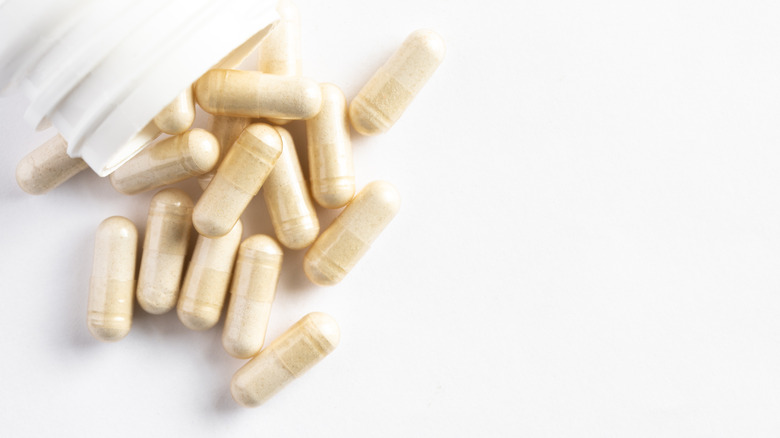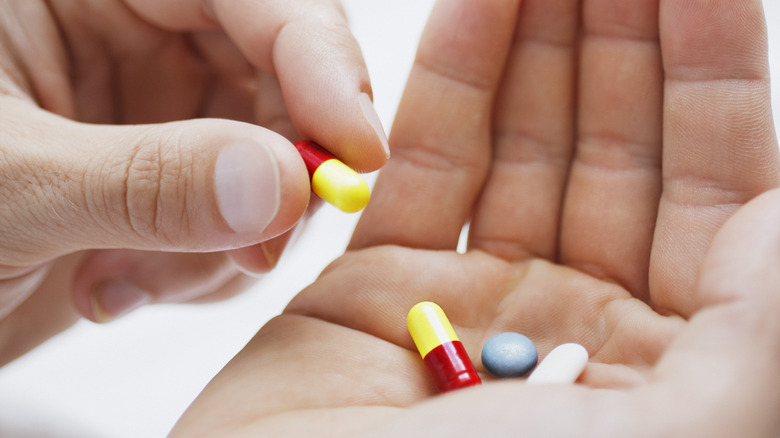Nootropics: Gimmick Or Genius? Uncovering The Truth And Lies About The Newest Buzzy Supplements
Nootropics are the new go-to when it comes to nutritional supplements. These would-be miracle cures claim to make you smarter, fix attention problems, clear up your skin, stabilize your mood, boost your sex drive, and help you lose weight by boosting your metabolism. Nootropics aren't exactly a recent invention, though. They occur in nature, and some of them, like caffeine, are part of our daily life. Nevertheless, supplemental nootropics have seen a boost in popularity in recent years. Brands like Hers, Moon Juice, and Tru Energy market the little miracle drugs as cure-alls. They rely on things like mushrooms and other naturally occurring ingredients to cure you of various conditions like brain fog and low mood.
The truth, though, is that it's a little more complicated than that. Nootropics, while part of our diet for years, are relatively new in the supplement world. That means there has yet to be much testing done. So while brands claim their products can make you smarter, thinner, and more attentive, they sometimes need the proof to back those claims up.
We're cutting through all the BS claims to figure out exactly what the deal is with nootropics and, more importantly, are they worth the money?
Not all nootropics are created equal
When it comes to nootropics, things can get confusing. In the simplest terms, nootropics are naturally occurring compounds that reportedly increase brain or bodily functions when ingested. So how do you get your hands on these miracle molecules? Usually, it's in the form of a supplement, but there are also plenty of nootropics you're likely ingesting daily without even knowing it. Caffeine, for example, is a very reliable nootropic. Caffeine works by activating neurotransmitters, which reportedly boosts short-term memory and jump-starts your metabolism.It gives you an instant burst of energy which can help you focus and stay alert for a short period of time.
Things get trickier when it comes to over-the-counter and prescription supplements. Prescription medications that rely heavily on nootropics, such as ADHD meds like Concerta or Adderall, work extremely well for someone with attention issues. However, the side effects can be intense, including weight loss, dry mouth, and increased heart rate.
When it comes to over-the-counter supplements, things get a little murky. If a supplement hasn't undergone rigorous FDA testing, there is no guarantee that it works — even if it claims to be loaded with well-known nootropics — or won't have adverse effects. So if you really think you're suffering from attention or executive functioning issues, it's always safer to get your nootropics from a prescription rather than over the counter.
Benefits of nootropics
Because not all nootropics are created equal, they won't all offer the same benefits. Some will help users improve their focus, while others help with organizational abilities or executive functioning. Essentially, almost all nootropics supplements claim to support cognitive flexibility. "For a wide range of life essential activities and feelings, cognitive flexibility is at the core," Ashley Jordan Ferira, Ph.D, explained to MBG. "Even simply reading a book and understanding what you're reading at the same time requires our brain to tap into our cognitive flexibility skill set." There is no cure-all even with these so-called miracle drugs, such as Omega-3 fish oil. Nootropics will address different parts of cognitive flexibility: some will claim to improve your memory, while others will claim to provide long-lasting energy.
On the other end of the spectrum are the nootropics that deal with mood. Some super supplements, such as kanna, can be a great option for someone suffering from anxiety. Kanna delays the body (neurons, specifically) from reabsorbing serotonin, extending serotonin's availability and activity in our brain and body," Emma Engler told MBG. To put it in layman's terms, kanna activates serotonin receptors, stabilizing mood and regulating anxiety. The benefits of kanna, specifically, have been rigorously tested. Studies have shown that using kanna to extend serotonin reduces stress and can make you more emotionally resilient in the long run.
Nootropics efficacy has been debated
While helpful, nootropics are far from a panacea. The most valuable nootropics have become a part of our day-to-day lives, like caffeine, or are part of complex chemical formulas in prescription medication. When navigating the world of non-prescription nootropics, particularly over-the-counter supplements, remember that studies proving the benefits of the substances can be misleading. "If you find a study that says that an ingredient caused neurons to fire on rat brain cells in a petri dish," Harvard Medical School assistant professor Pieter Cohen told GQ, "you can probably get away with saying that it 'enhances memory' or 'promotes brain health.'"
Translation: believe only some of what you read. Unlike prescription medication, which must undergo years of government-regulated testing before it's market-ready, over-the-counter supplements can claim just about anything with little to no proof. Be particularly wary of products that claim to increase focus or remedy executive functioning issues. Though it's a growing market, minimal testing has been done on supplements that replace Adderall or Ritalin. Experts think that any proof a nootropic supplement had a positive effect on a user's attention span has a lot more to do with the demands of the user's day than it does the nootropic being a miracle cure.
Ultimately, if you're looking for a natural, non-prescription cure for attention problems, you're far better off getting regular exercise and eating a healthy diet than investing in an expansive supplement routine.
Nootropics won't raise your IQ
The biggest myth about nootropics is that they can make you smarter. While some, like caffeine or the complex ingredients found in Ritalin, can make you pay attention and thus make someone with an attention deficit perform to their full potential, nothing will make you smarter. "I think people think about smart drugs the way they think about steroids in athletics," Amy Arnsten, a professor of neurobiology at Yale Medical School, told BBC. "With smart drugs, all you're doing is taking the brain that you have and putting it in its optimal chemical state. You're not taking Homer Simpson and making him into Einstein." You're probably better off doing daily sudoku or learning an instrument if you want to flex your brain muscles.
Interestingly, some research suggests that the increased intelligence and mental clarity some users report after starting a nootropics routine is a by-product of the supplements' calming effects. "What most of these are actually doing is enabling the person who's taking them to focus," Steven Rose, a professor of life sciences at the Open University, told BBC. "It's peripheral to the learning process itself." So if you start taking a nootropics-based supplement and suddenly notice that your work or grades drastically improve, it could indicate an underlying attention or anxiety issue that would best be addressed with a doctor rather than managed through supplements.
Watch out for side effects
For all their good, nootropics are not without their issues. While the side effects of a nootropics-based supplement are usually minimal, you still risk internal damage if you're taking anything over the counter that a professional didn't prescribe.
The most common side effect associated with nootropics, which can happen if you take a large dose or simply take one that doesn't agree with you, is brain fog — ironically, the exact condition many supplements claim to remedy. Sufferers report feeling a general lack of motivation and difficulty paying attention. Not deadly by any means, but annoying. The second most common side effect is an increased metabolism. Serious medical issues notwithstanding, your body is designed to digest food, process it, and pass waste within a specific time frame. So if you reach for nootropics supplements because they get things moving down there, it might be time to see a doctor. You could have an underlying medical issue or need to improve your diet.
As far as experts know, most nootropics' side effects are minimal and rarely dangerous. However, remember that very little research has been done on nootropics' long-term effects, particularly regarding brain toxicity, so take at your own risk.





